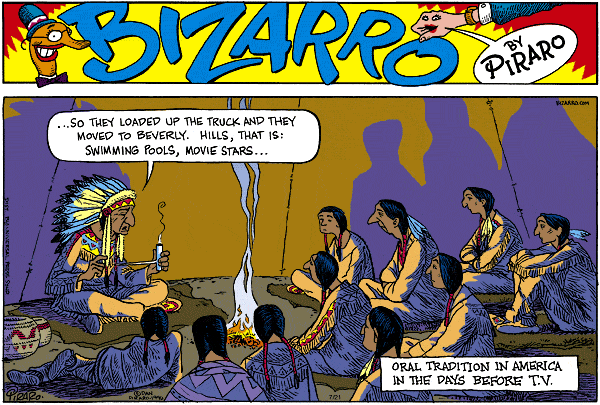 Another Stereotype of the Month entry:
Another Stereotype of the Month entry:
 Another Stereotype of the Month entry:
Another Stereotype of the Month entry:
From the Arizona Daily Star, 1/7/04:
Local Indian leaders say Arizona's school superintendent is "insensitive" for quoting a classic's passage that describes peoples who do not use a written language -- as many Indian tribes do not -- as a "herd of savages incapable of knowledge or reflection."
The quotation is in the "State of Education" speech that Superintendent Tom Horne gave Tuesday in Phoenix. He will deliver the speech this morning at Marana Middle School and Thursday in Northern Arizona.
"I was dismayed that in the 21st century the superintendent of public instruction would include such a quote in his speech," Tohono O'odham Chairwoman Vivian Juan-Saunders said.
Horne defended the passage and described it as eloquent and inspiring.
"It's an inspiration -- there's no way to take it in any other way unless you choose to twist it, and that's a conscious choice you make," Horne said Tuesday. "The passage has nothing to do with Native Americans."
Horne's 17-page speech includes a passage from "The Decline and Fall of the Roman Empire" by Edward Gibbon, who wrote in the mid-1700s, in a section of the speech on the benefits of literacy and learning history.
"Without some species of writing, no people has ever preserved the faithful annals of their history, ever made any considerable progress in the abstract sciences or ever possessed, in any tolerable degree of perfection, the useful and agreeable arts of life."
Using the passage shows insensitivity to the accomplishments and vibrant cultures of Indians living in Arizona, Juan-Saunders said.
Students should be well-educated, the leaders say, but the Indians' oral traditions and achievements should not be dismissed.
"He needs some educating about our state and the rich history of the Native American cultures that were here prior to any European contact and are still here and continue to survive," she said.
Many Indian languages -- including those of the Tohono O'odham, Pascua Yaquis and Navajos -- were unwritten until European missionaries, conquistadors and anthropologists began putting them on paper.
Some Indian tribes are now creating written dictionaries as a way to preserve their languages from extinction. Because of a history of forced assimilation, tribal officials say, fewer and fewer young people grow up knowing the traditional language.
"Arizona has 21 Indian nations -- we are one of the few states that have a large population of tribes with a very rich history," Juan-Saunders said. "Our ancestors were mathematicians, scientists, astronomers, and were able to accomplish so much without modern technology."
The passage was written in a time with a very narrow view of what was civilized and valid, said University of Arizona Regents Professor Jane Hill, who specializes in anthropology and linguistics.
"It's not a quote that reflects a great deal of sensitivity to the fact that there were fantastic cultures in the New World that did not have written language but had large economic systems, architecture and astronomy," she said.
"It's a poor choice of quote in the state of Arizona," Hill said. "It's exclusionary, insensitive and anachronistic.
"This was the thinking of the late 18th century -- we've come a long way since then," she said.
Horne said he chose the quotation because the author was "writing about what great literature and the study of history can do."
"Every person can and should be inspired by that passage," he said.
Maria Amarillas, the Pascua Yaqui Tribe's language development administrator, questioned the use of "savage" in the passage.
"The savages are the ones who came across the ocean looking for new lands and proceeded to bring diseases and practice atrocities," Amarillas said. "I call that being a savage, irrespective of being able to read or write.
"I think the remarks are just very insensitive, and an intelligent person would not make these kinds of statements, because you don't want to insult people," she said. "He needs to throw that book away."
Related links
Uncivilized Indians
Savage Indians
|
. . . |

|
All material © copyright its original owners, except where noted.
Original text and pictures © copyright 2007 by Robert Schmidt.
Copyrighted material is posted under the Fair Use provision of the Copyright Act,
which allows copying for nonprofit educational uses including criticism and commentary.
Comments sent to the publisher become the property of Blue Corn Comics
and may be used in other postings without permission.